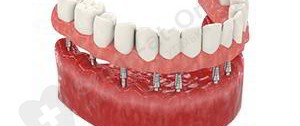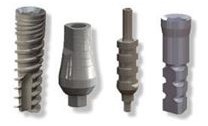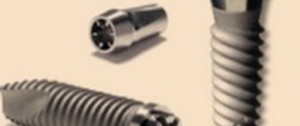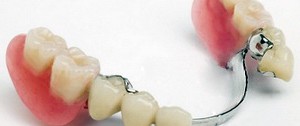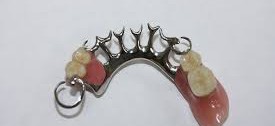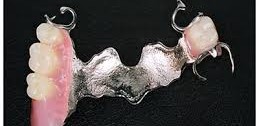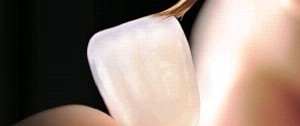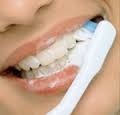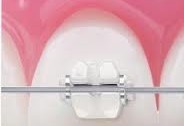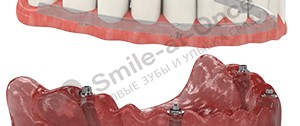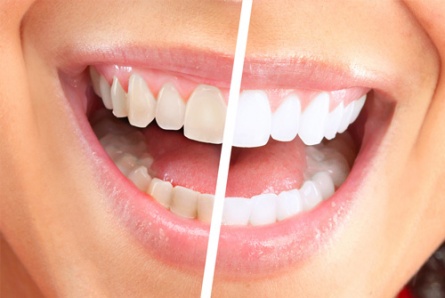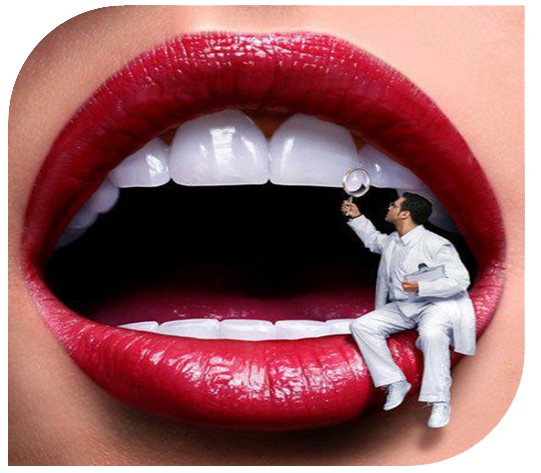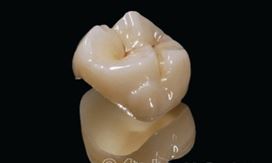
Dental prosthetics - This is the procedure for installing dentures.
Dental prosthetics helps to solve the problem of the absence of one or more teeth.
Lack of teeth or their defects can not only make a smile ugly, but also cause irreparable harm to health.
Thanks to modern methods of dental prosthetics, in place of missing teeth, it is possible to create beautiful and complete dentures.
Types of prosthetics (which happens)
Classical dentistry distinguishes two methods of prosthetics:
- tooth restoration;
- actually dental prosthetics.
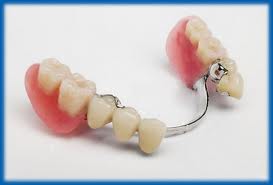
Tooth restoration is carried out using fillings, tabs, and the installation of pins.
Actually dental prosthetics includes a large number of options.
There are removable, conditionally removable and non-removable prosthetics.
Removable dentures I can be of several types:
- combined dentures;
- arch prostheses;
- small prostheses (as a kind of cosmetic prostheses).
Not so long ago, another type of prosthetics appeared - dental prosthetics with micro-locks.
Fixed prostheses:
- microprosthesis;
- crowns;
- bridges;
- dental implantation.
Which are better? Only a doctor can answer this question.
How is prosthetics done?
How to start the installation of dentures? To find out how dental prosthetics are done, you need to contact a dental clinic.
The clinic must be licensed for this type of service. This is necessary in order to be able to make a refund for prosthetics if the service proves to be of poor quality.
Doctor after a preliminary examination will tell you which is better to put a denture. The color of the dentures must be selected in advance.
Dental prosthetics are carried out in several stages.
- Preparatory stage. At this stage, examination and treatment of diseased teeth is carried out. Extraction of teeth before prosthetics, if they are dead.
- Preparation of supporting teeth under crowns. How does tooth processing under the crown occur? Turning is done
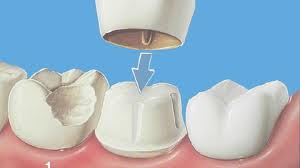
Photo: correctly sharpened tooth crown tooth, as a result, it is given a strictly defined form. Two points are very important: a smooth ledge correctly formed near the gums and a tooth shape.
- Taking a cast. Some people may experience a gag reflex during imprinting.
- The installation of temporary plastic crowns must be done, especially if a live tooth is processed under it.
- Making a prosthesis by a dental technician in a laboratory. Usually, a wax model of the prosthesis is pre-made, on which the final design will be made. Modern technologies allow for computer prosthetics.
- Fitting and fitting of dentures.
- Fixation of dentures. If the jaw structure has structural anomalies, then special fixing strips are used to fix the dentures.
Duration of prosthetics (how long does it take)
The terms of dental prosthetics depend on the type and size of the installed structure, the material that the patient has chosen, as well as on the method of fixation and the presence of fixtures.
Putting a crown on one tooth will take no more than five days. Prosthetics with single-standing teeth is possible for five to seven days. Cast dentures are made a little longer. The manufacturing time for a bridge depends on the type and number of crowns. Such dentures cannot be delivered in less than 10 days.
Indications and contraindications
Indications for dental prosthetics.
- Increased abrasion of tooth enamel.
- Partial or complete destruction of the tooth crown.
- The absence of one or more teeth.
- Multiple defects in the dentition.
Contraindications to prosthetics.
There are no absolute contraindications to dental prosthetics.
Relative contraindications for the installation of prostheses are poor oral hygiene of the patient. It is not recommended to perform a prosthesis with a history of epilepsy.
Relative indications can also include:
- Acute diseases of the oral cavity or the body as a whole.
- Pregnancy.
- Addiction.
- Condition after radiation therapy.
- Inflammatory diseases of the oral cavity.
Pros and cons of prosthetics
Pros of dental prosthetics.
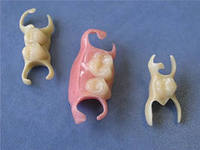
- A prosthesis completely replaces one or more teeth.
- Dental prosthetics are cheaper than implantation.
- The solution to the aesthetic problem, if you use a cosmetic denture.
- To install the prosthesis, it is not necessary to completely remove the defective teeth.
- Total dental prosthetics is possible, even if they are completely lost.
Disadvantages of prosthetics.
- False teeth have a limited lifespan.
- The complexity of the installation in the absence of a tooth root.
Complications
Complications after prosthetics.
- Poor prosthetics can cause stomatitis. It can develop when the prosthesis is too tight to the gum. Gold dentures prevent inflammation and heal gums.
- In the place of close contact of the crown of the artificial tooth with the gum, pressure sores from dentures are often formed. This is due to the fact that as a result of the prolonged pressure of the prosthesis on the gum, the blood supply is disturbed, and necrotic changes begin at the place where the prosthesis contacts the gum.
- Periodontal inflammation as a result of irritation with a crown of surrounding tissue.
- Tooth decay under crowns as a result of improper care of the oral cavity and dentures. For care, use a special solution for dentures.
- An allergic reaction to the materials from which dentures are made.
- Galvanic syndrome. If there are different metals in the mouth.
Denture pricing
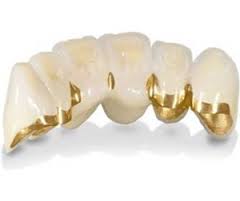
- If you take the prices of various types of dentures, then the cheapest dentures — removable dentures made of acrylic plastic. Their cost - from 2500 rubles.
- How much does a nylon prosthesis cost? Synthetic denture 4 times more expensive than plastic.
- The price of prosthetics depends on the material. Ceramics are more expensive than cermets. Prices for prostheses from cermet from 3000 rubles for a stamped crown.
Aesthetic prosthetics
Aesthetic prosthetics today it allows to improve not only their appearance, but also quality.
Cheap dentures cannot fulfill the requirements of aesthetic dentistry, because they are made from cheap and unsafe raw materials.
- Dental prosthetics should be performed with high-tech materials, one of which is zirconium. It has chemical stability and high strength.
- Titanium dentures have an advantage over other metals, because titanium is biologically compatible with oral tissues.
- Glass fiber prosthetics can create very strong teeth.
Latest prosthetics technology
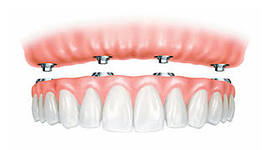
- All-on-4 prosthetics is a new technology based on the fixation of teeth on four implants. Particularly suitable for patients who have completely missing teeth.
- Japanese scientists have developed a new technology. They managed to implant dentures.
